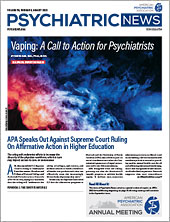Millions of people are negatively impacted by the behaviors of friends and loved ones with alcohol use disorder (AUD). While these people (known clinically as “concerned others”) may have a peripheral role in an alcohol treatment plan of their friend or loved one, their own mental health needs are often overlooked.
Christie Timko, Ph.D., a clinical professor (affiliated) of psychiatry and public mental health at Stanford University, described how to recognize and support the mental health of concerned others during a session at the APA Annual Meeting in May.
Similar to caregivers of people with serious conditions such as dementia or autism, concerned others exhibit increased stress, poor quality of life, poor physical health, and more. Timko cited statistics from the support group Al-Anon that suggested many concerned others are troubled by their loved one’s drinking for nearly a decade before they seek help.
Even when concerned others look for mental health support, defining what recovery looks like can be challenging, as most current recovery definitions regarding alcohol use center around reducing drinking behaviors.
Timko said that while there is no consensus definition for the recovery of concerned others, there is some agreement that recovery involves relief from the negative impacts of drinking— both emotional (stigma, stress, poor mental health) and physical (financial problems, accidents, abuse).
Surveys of concerned others participating in mutual help groups themselves have suggested that two key concepts for successful recovery are serenity and loving detachment. The former is the ability to have a sustained sense of inner peace independent of external events while the latter is being able to let the drinker in their life experience the consequences of addiction without feeling guilty or responsible.
These concepts are important from a treatment perspective, Timko said. “It clarifies that [concerned others] can recover even if loved ones do not.” On the flip side, concerned others may continue to need help even after their loved one recovers.
So how can clinicians help? “Identify the problem, treat [what you can], and refer,” she told the audience. Studies have shown that concerned others are more likely to seek support when referred by a professional compared with a friend.
In addition to 12-step programs, such as Al-Anon or Adult Children of Alcoholics and Dysfunctional Families, concerned others may benefit from participation in the following programs:
•
CRAFT (Community Reinforcement Approach and Family Training): This is a motivational-based psychotherapy that educates concerned others about how to interact with their loved one to discourage their alcohol use and enter a treatment program. The program helps concerned others set a treatment plan and teaches them important skills like how to identify risky drinking situations. Ideally CRAFT services are available at the same site that a loved one can receive AUD treatment to facilitate entry into such programs.
•
The 5-Step Method: This is a brief, semistructured psychosocial intervention that helps concerned others learn to communicate and cope with their loved one with AUD while also offering positive reassurance. Timko said this therapy is well-liked by concerned others since it looks at them as individuals, rather than prioritizing their role as caregivers.
•
SMART Recovery Family and Friends: Taking some elements from CRAFT, this secular mutual support program teaches concerned others how to be supportive caregivers without supporting addictive behavior.
Clinicians treating concerned others should listen to their patients’ needs, make a collaborative decision on the treatment type, and monitor their progress to keep them engaged. “Be a champion for change,” she said. ■

